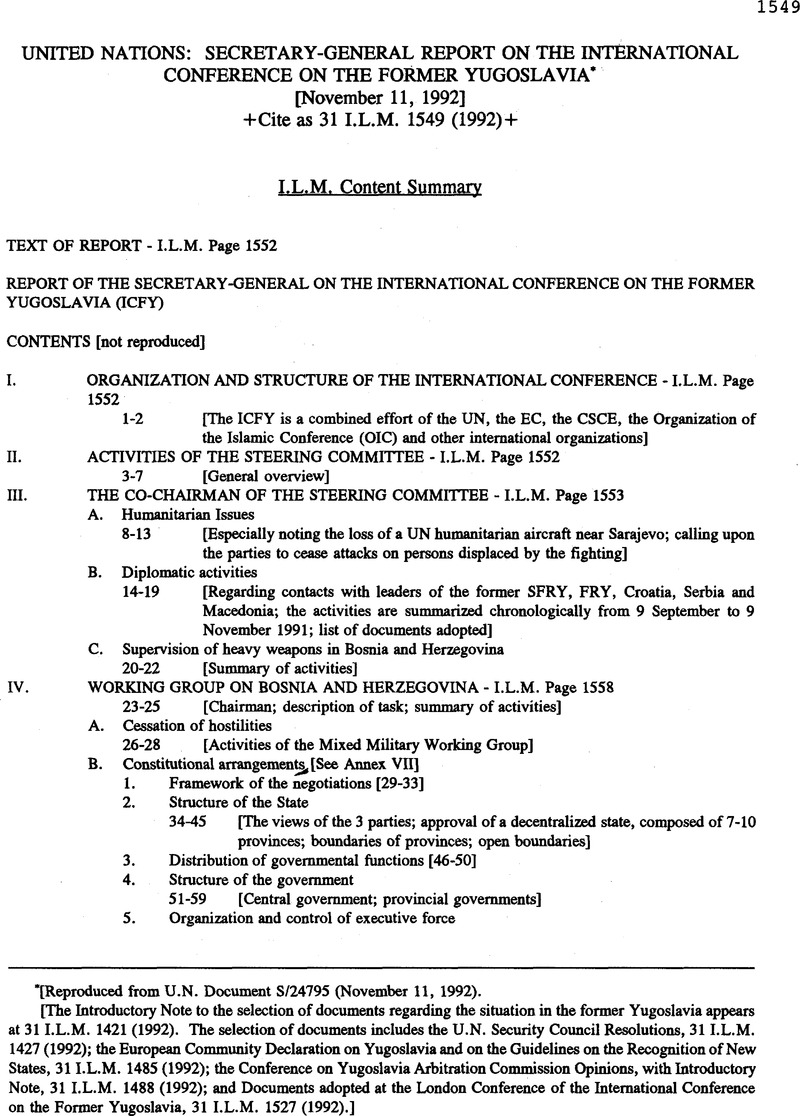Article contents
United Nations: Secretary-General Report on the International Conference on the Former Yugoslavia
Published online by Cambridge University Press: 27 February 2017
Abstract

- Type
- Documents Regarding the Situation in the Former Yugoslavia (September 25, 1991—November 16, 1992)
- Information
- Copyright
- Copyright © American Society of International Law 1992
References
* [Reproduced from U.N. Document S/24795 (November 11, 1992).
[The Introductory Note to the selection of documents regarding the situation in the former Yugoslavia appears at 31 I.L.M. 1421 (1992). The selection of documents includes the U.N. Security Council Resolutions, 31 I.L.M. 1427 (1992); the European Community Declaration on Yugoslavia and on the Guidelines on the Recognition of New States, 311.L.M. 1485 (1992); the Conference on Yugoslavia Arbitration Commission Opinions, with Introductory Note, 31 I.L.M. 1488 (1992); and Documents adopted at the London Conference of the International Conference on the Former Yugoslavia, 31 I.L.M. 1527 (1992).]
* Previously issued in document A/46/971-S/24553.
* Previously issued in document S/24476.
* Previously issued in document A/47/571-S/24702.
* Previously issued in document A/47/572-S/24704.
a/ If the provinces are not all economically viable, or if some are much poorer than others, then some sort of resource transfer among them may have to be envisaged, possibly utilizing the taxing power of the central government.
b/ Possibly as part of an international authority.
c/ This means that each group can form one or more parties - but there might also be parties on purely political, provincial or ideological bases.
d/ It will be necessary to indicate whether the word “balance” means “equal” or “proportional” representation.
e/ The Constitution will have to specify precisely the division of responsibilities between the President and the Prime Minister.
f/ Normally appeals to the national appellate courts would have to be on a guestion of national law (i.e., involving the Constitution, national legislation or international treaties), so that for most other issues the provincial appellate court would be the highest instance reached.
g/ The Constitutional Court, whose primary function would be to settle disputes among constitutional authorities, would be a court of first instance for such cases i.e. such disputes would be brought to it directly and could be disposed of as quickly as the matter required in preference to the Court's appellate jurisdiction specified in the sentence following the several subparagraphs.
h/ This term will require special attention and definition in respect of Bosnia and Herzegovina, because on the one hand no ethnic or other group has an absolute majority in the country as a whole, so that in a sense all are minorities, but it is likely that in many regions one group will have a clear majority.
i/ In addition to the arrangements listed below, account should also be taken of the international supervision provided on a normal basis by the special organs created by the human rights treaties to which Bosnia and Herzegovina will be obliged to become a party (to be specified in the Constitution (VI.A.I) see para, (c) of the appendix hereto).
a/ In the list herein, treaties are unSerlined and other instruments (e.g., declarations) are not.
b/ In this list, those treaties are marked with an asterisk (*).
c/ Such bodies are indicated in this list by double underlining.
d/ This list does not include about a dozen instruments, including a number of CSCE declarations that would fit under categories k, or B, that do not appear to meet the criteria in paragraph (a) above or as to which it otherwise appears doubtful that inclusion in the BiH Constitution should be demanded, but which were included in a list of human rights instruments provided to the parties for their information.
e/ The instruments listed herein are those dealing specifically with the rights of minorities. In addition, a number of the instruments listed in section A also have relevant provisions on this subject.
f/ The instruments listed herein are those dealing specifically with questions relating to citizenship and nationality. In addition, a number of the instruments listed in section A also have relevant provisions on this subject.
- 1
- Cited by


